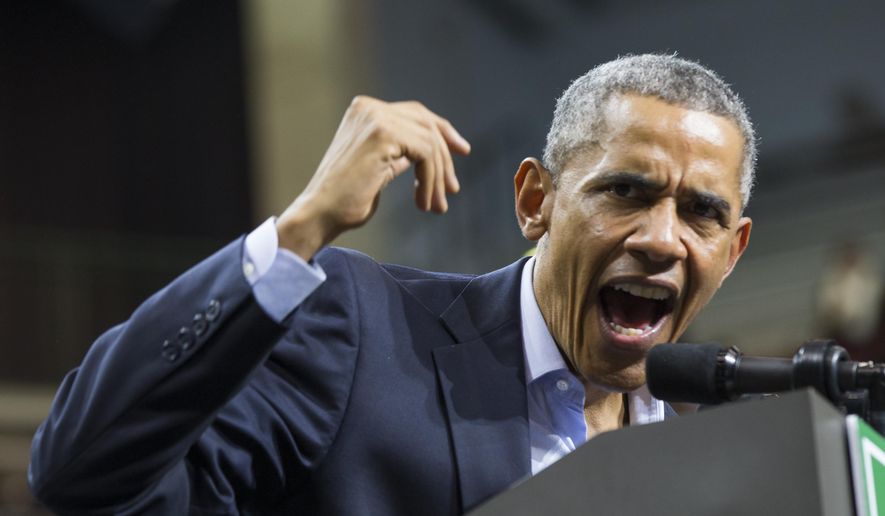He is still bashing Republicans at every turn, but President Obama’s rhetoric this midterm campaign cycle has evolved from broad warnings about the dangers posed by the GOP to an issue-specific pitch designed to get Democratic voters off the couch and to the polls.
Mr. Obama’s appearances on the stump, limited entirely to gubernatorial candidates thus far, now feature specific reasons why voters should choose Democrats: to raise the national minimum wage, pass immigration reform, enact equal pay legislation and other items on the White House agenda.
Four years ago, the president also singled out certain issues but was far more interested in characterizing the Republican Party as a whole as an instrument of Wall Street that, if given power, would cut taxes for the rich, dismantle federal regulations and leave the middle class high and dry.
Political analysts say the subtle shift in tone underscores the president’s desire to motivate the Democratic Party base, which traditionally turns out in lower numbers for midterm elections.
Mr. Obama’s recent stump speeches — for Maryland gubernatorial hopeful Anthony Brown, Illinois Gov. Pat Quinn and Wisconsin gubernatorial candidate Mary Burke — have included references to a fictional “cousin Pookie” who must be persuaded to get out and vote, the president says.
To persuade “Pookie” and other Democrats indifferent toward voting to head to the polls, Mr. Obama typically ticks off a number of hot-button issues.
“If you don’t think we need more tax loopholes for companies shipping jobs overseas, and instead think we should give tax breaks to companies that are investing here in Maryland, here in America, you’ve got to vote. If you think we don’t need more tax breaks for millionaires but we do need tax breaks to help working families pay for college for their kids, you’ve got to vote,” Mr. Obama said at a recent campaign event for Mr. Brown, Maryland’s sitting lieutenant governor. “If you think Congress should stop trying to deport striving young dreamers and pass immigration reform that they’ve blocked for a year, you’ve got to vote. If you believe we shouldn’t be cutting workers’ wages, but guaranteeing hardworking Americans that they get an honest day’s pay for an honest day’s work, you’ve got to have your voice heard and you’ve got to vote.”
Analysts say the concerns Mr. Obama routinely mentions on the campaign trail may not convince independents or convert Republicans, but it may rally the party’s base voters, each of whom is likely passionate about one or two specific issues.
“It might get somebody off the couch,” said Lara Brown, program director at George Washington University’s Graduate School of Political Management. “And if you look at the overall Democratic strategy the way they save the Senate and move themselves forward is to start doing what they haven’t done, which is turning out their base in midterm elections.”
Four years ago, with his party in control of the House and a filibuster-proof majority in the Senate, Mr. Obama tried to rally the Democratic base but could not blame Republicans for blocking specific pieces of legislation or standing in the way of certain White House priorities.
Instead, the president largely stuck to the same message that propelled him to the Oval Office after the dawn of the 2008 financial crisis: Republicans will tank the economy if given control.
He delivered that message in broad strokes and colorful analogies.
“These folks drove the car into the ditch. We all put on our boots, and we went down into that ditch. And it was muddy and it was nasty and hot. And there were bugs,” the president said at a 2010 rally for Sen. Christopher A. Coons, Delaware Democrat. “We kept on pushing. We kept on pushing. And finally we got this car up on level ground, pointing in the right direction. Suddenly, we get this tap on our shoulder and we look back. And who is it? The Republicans. They say, ’Excuse me, can we have the keys back?’ And we got to tell them, ’No, you can’t have the keys back. You don’t know how to drive.’”
Mr. Obama’s message ultimately failed. Democrats in 2010 lost 63 House seats and six Senate seats.
• Ben Wolfgang can be reached at bwolfgang@washingtontimes.com.




Please read our comment policy before commenting.